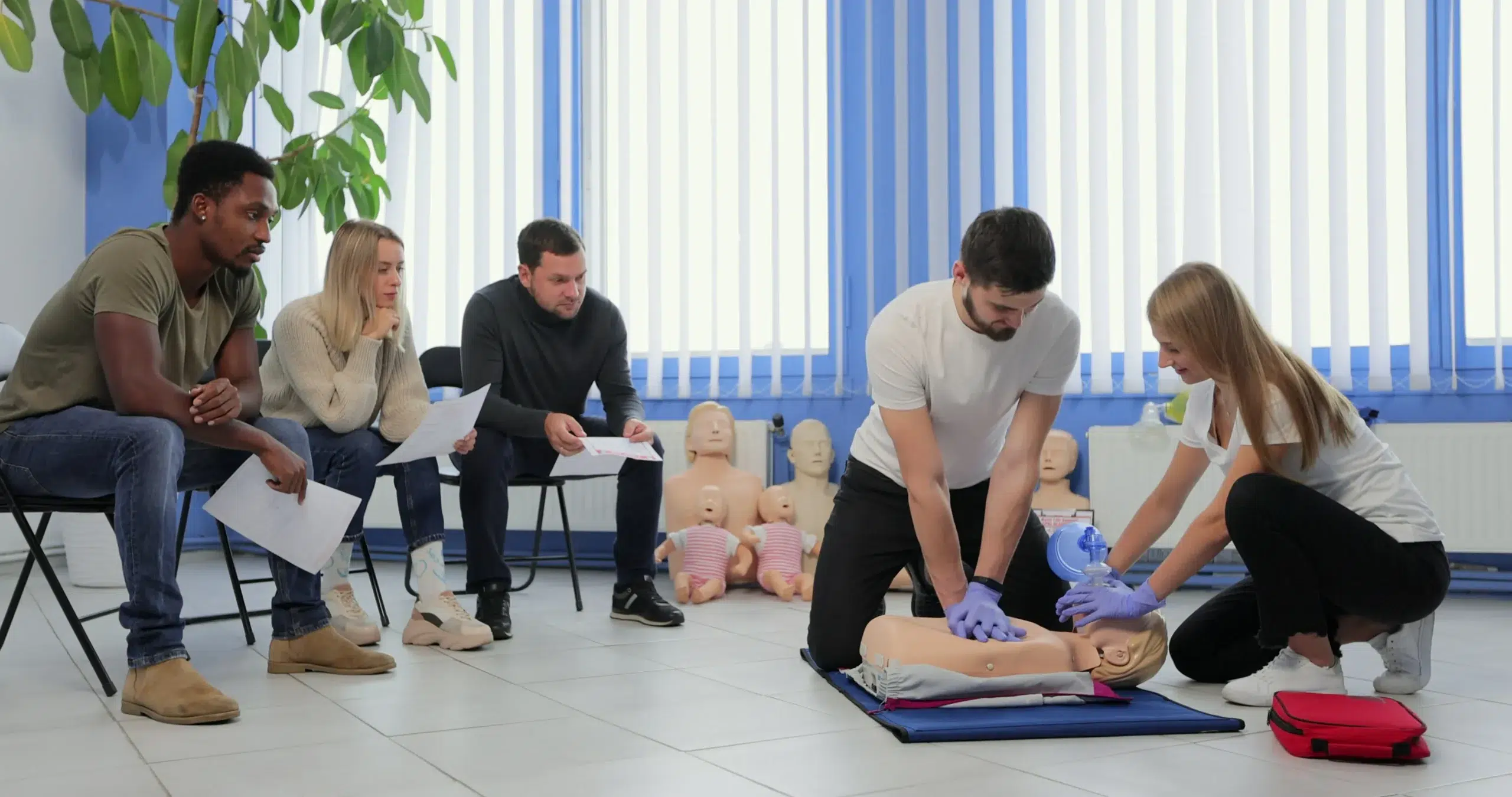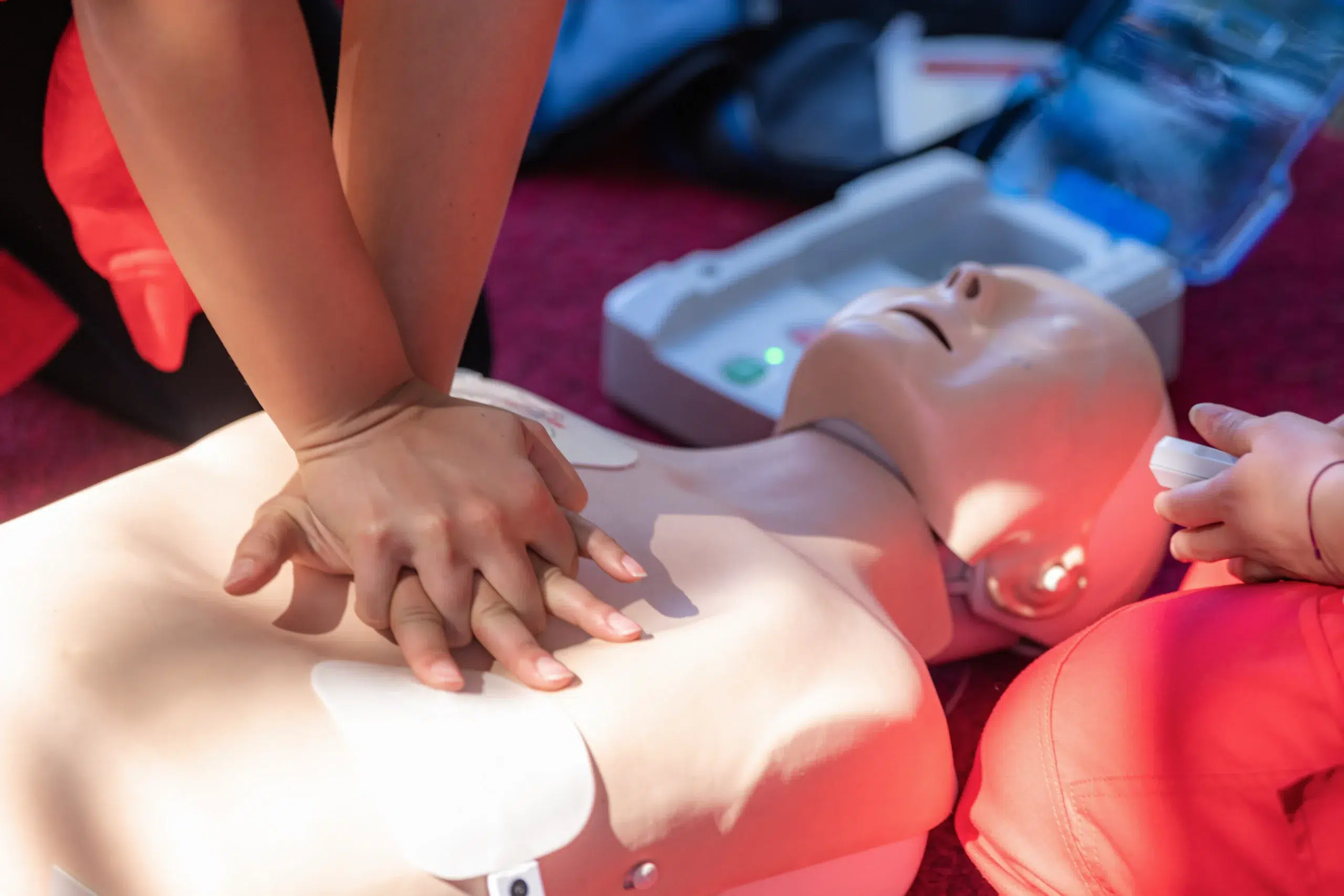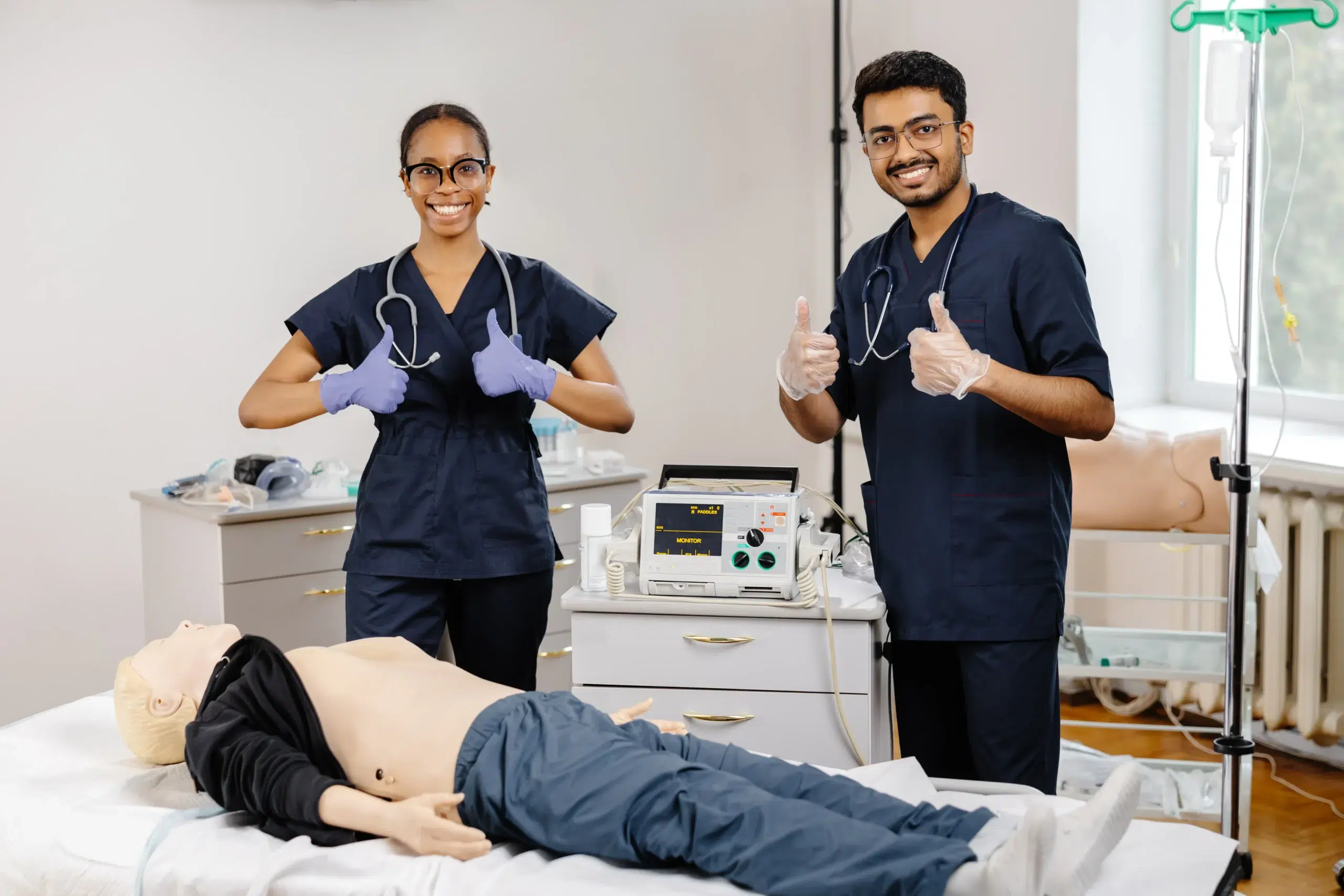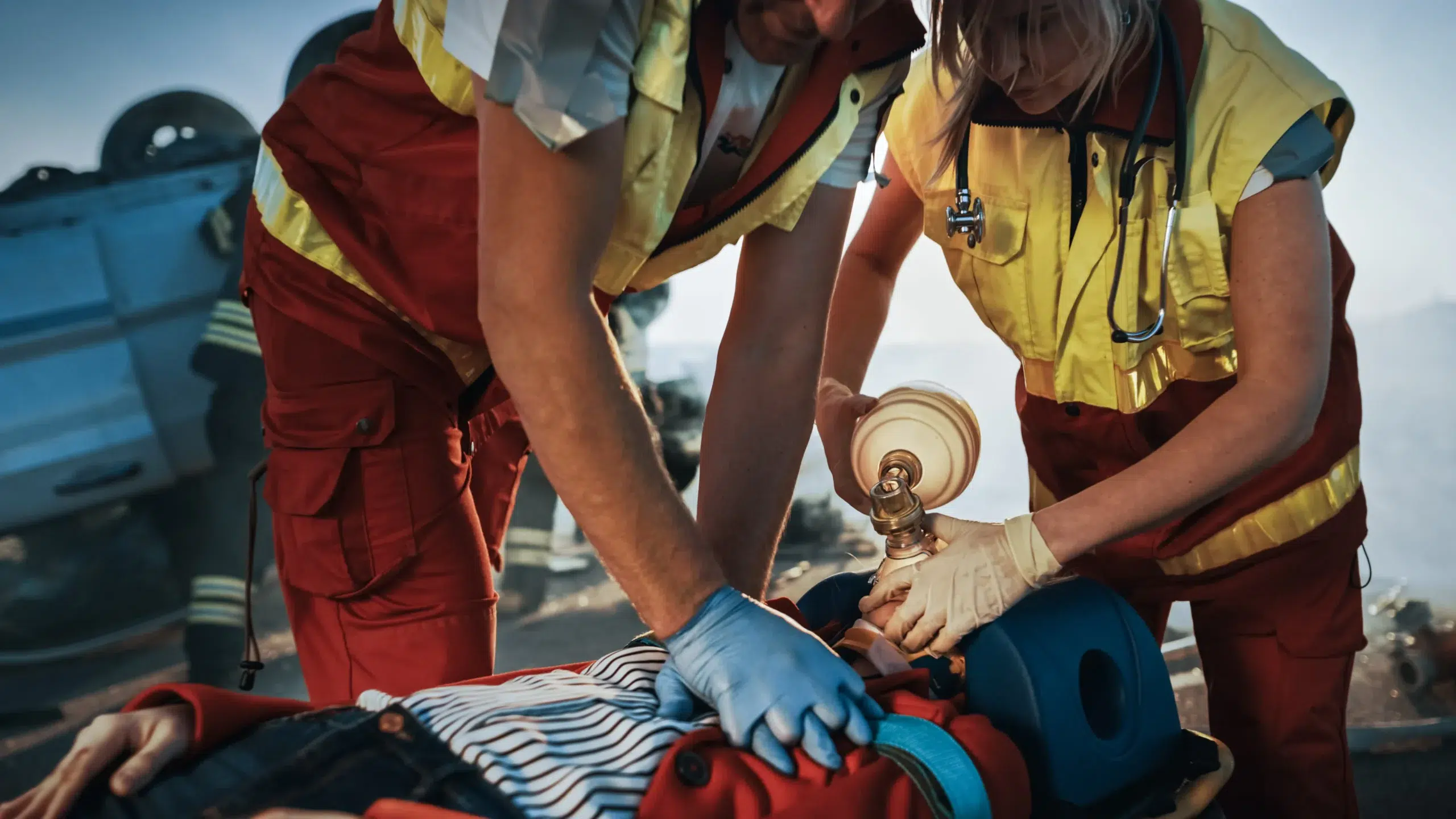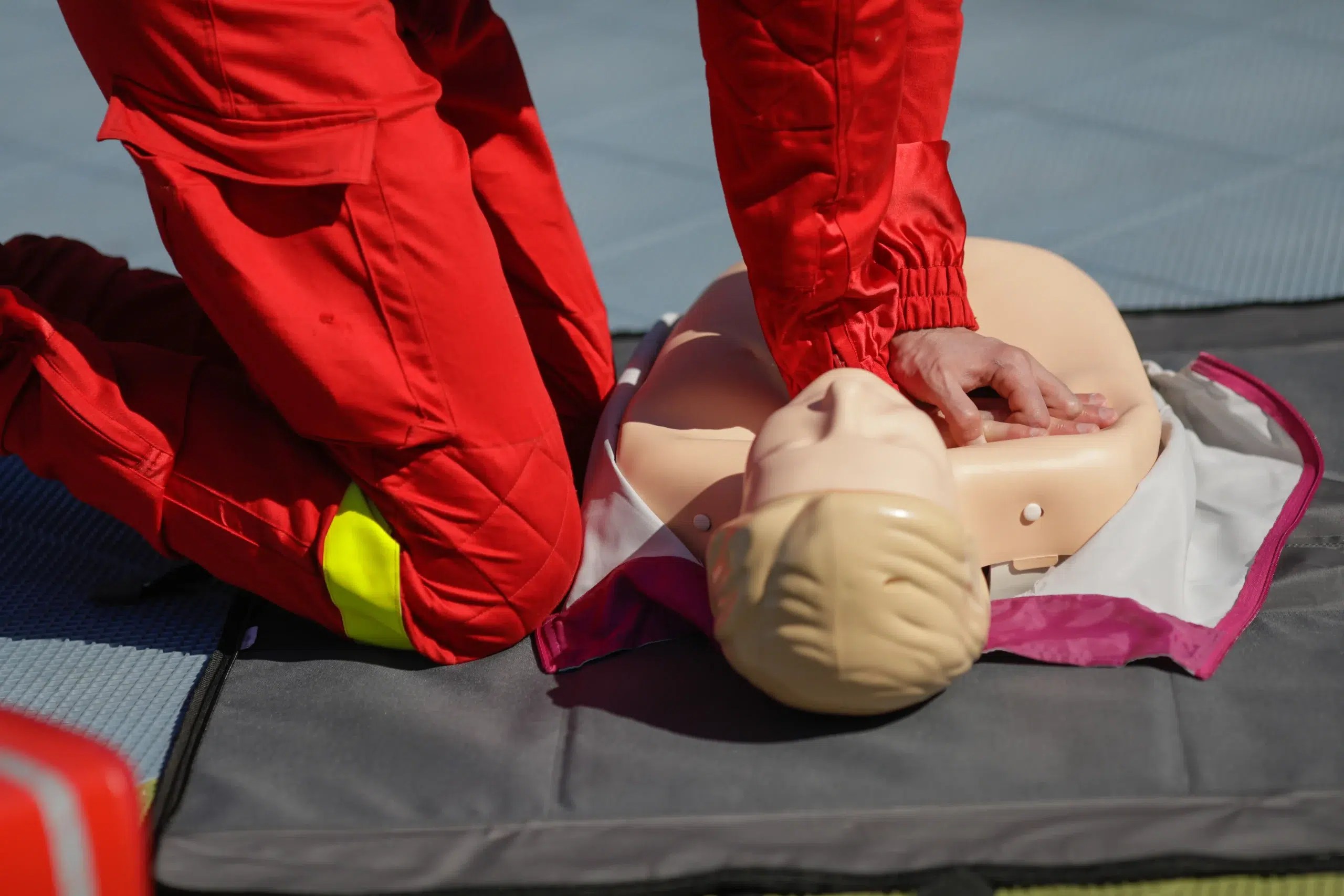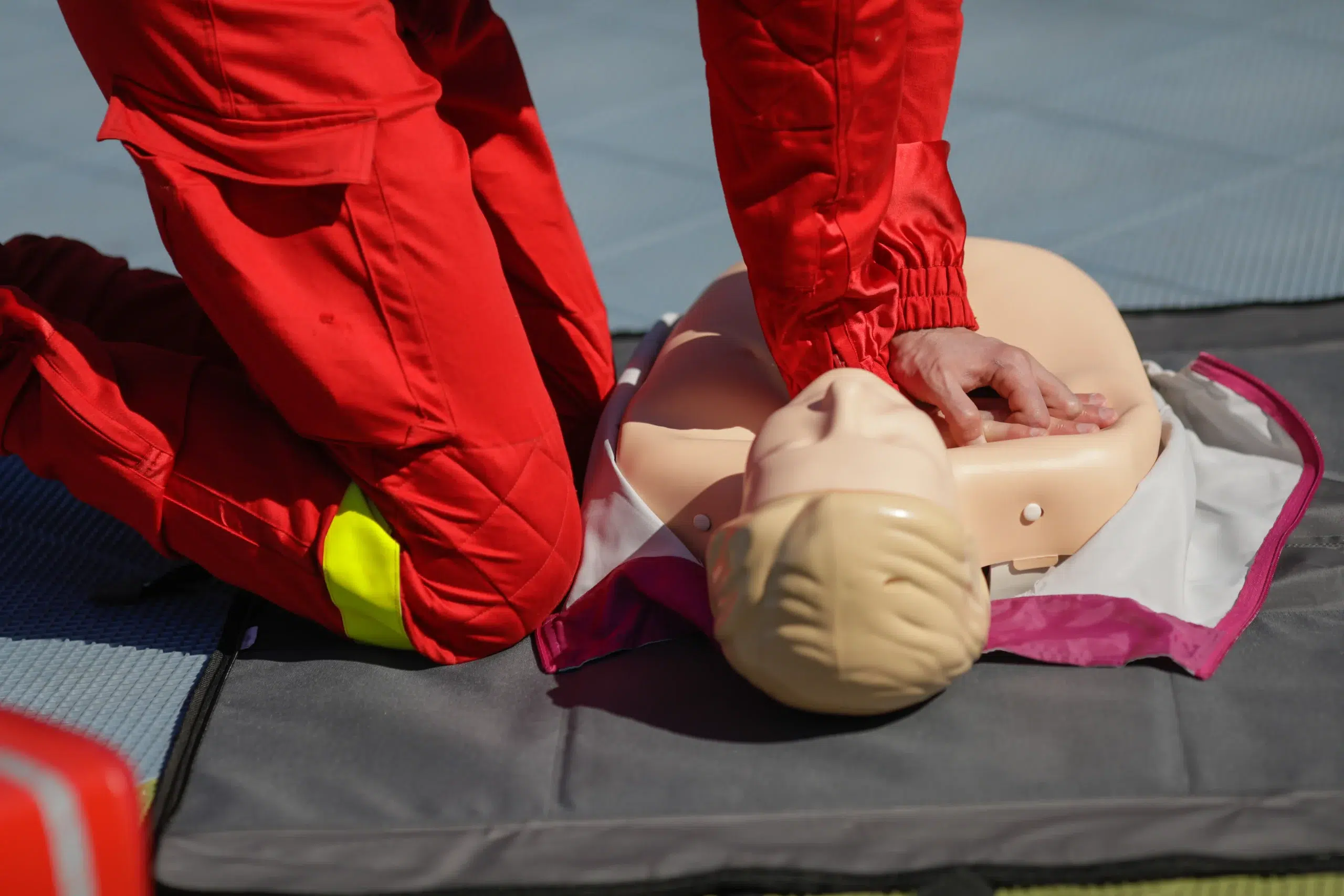Working in healthcare often means a packed schedule, making it tough to fit in necessary certifications like BLS renewal. But staying current with your American Heart Association (AHA) BLS training is crucial for providing top-notch patient care. This guide makes the renewal process easier, breaking down everything you need to know. We’ll cover what’s involved in a renewal course, where to find AHA BLS Renewal nearby, and how to choose the right provider. Plus, we’ll explore the various class formats available, from traditional in-person classes to convenient online options, and offer tips for preparing for your renewal. Let’s explore how you can keep your lifesaving skills sharp without disrupting your busy schedule.
Key Takeaways
- Regular BLS renewal keeps your lifesaving skills sharp: Staying certified ensures you’re up-to-date on the latest AHA guidelines and best practices, boosting your confidence in emergencies. Choose a renewal format—in-person, online, or blended—that fits your schedule.
- Finding a BLS renewal course near you is straightforward: Search online, compare local providers like Safety Training Seminars, and check for AHA accreditation. Consider factors like cost, schedule flexibility, and available learning resources when making your decision.
- Maximize your BLS renewal experience: Prepare by reviewing core concepts and practicing your skills. Use the opportunity to network with other professionals and explore ways to apply your skills in real-world scenarios. This proactive approach reinforces your training and strengthens your ability to respond effectively in emergencies.
What is AHA BLS Renewal?
The American Heart Association (AHA) Basic Life Support (BLS) renewal course is for healthcare providers and other professionals who need to maintain their CPR certification. The AHA offers a few ways to renew your BLS card, including convenient online courses and traditional in-person classes. This flexibility lets you choose the learning format that best fits your needs and schedule.
Key BLS Certification Components
A BLS renewal course takes roughly three hours to complete, covering essential life support skills, CPR techniques, and the latest AHA guidelines. Before signing up, confirm you’ve completed an AHA BLS Provider or Renewal course sometime within the past two years. These courses teach how to recognize life-threatening emergencies, provide high-quality chest compressions, deliver appropriate ventilations, and use an automated external defibrillator (AED).
Why Renew Regularly?
Renewing your BLS certification keeps your lifesaving skills current and ensures you’re up-to-date on the latest guidelines. It also demonstrates your commitment to providing excellent care. Staying current on BLS recertification requirements for healthcare professionals is crucial, allowing you to adapt to evolving research and best practices in emergency care. Regular renewal helps you maintain confidence and competence in critical situations.
Find AHA BLS Renewal Classes Near You
So, your BLS certification is about to expire—now what? Don’t worry, renewing is straightforward. This section walks you through finding the right course, whether you prefer online convenience or hands-on, in-person training.
Search Online Effectively
Start your search online. Use specific keywords like “AHA BLS Renewal near me” or “BLS Recertification San Jose” to narrow your results. Many training centers maintain online calendars where you can view schedules and quickly register for a class.
Verify Provider Credentials
Before you sign up for any class, double-check that the provider is legitimate and offers AHA-accredited courses. This ensures your certification will be recognized and accepted. Look for experienced instructors and read reviews from past students. A little research upfront can save you time and hassle. Safety Training Seminars is a trusted provider offering a range of AHA-certified courses.
Explore Local In-Person Options
If you learn best in a traditional classroom setting, explore local options. Safety Training Seminars offers BLS renewal courses right here in San Jose, convenient for anyone in the surrounding areas like Santa Clara and Sunnyvale. In-person classes provide hands-on practice and direct interaction with instructors, which can be invaluable for building confidence and mastering essential skills. You can also check with local hospitals and community colleges, as they often host certification courses.
AHA BLS Renewal Class Formats
Renewing your BLS certification involves a few different learning options. Understanding the pros and cons of each format can help you choose the best fit for your schedule and learning style. Let’s break down the most common class formats: in-person, online, and blended learning.
In-Person Classes: Pros and Cons
In-person BLS renewal classes offer a traditional learning environment with direct interaction with your certified instructors and classmates. This format excels at providing immediate feedback and allows you to ask questions in real-time. The hands-on practice with equipment and scenarios is invaluable for building muscle memory and confidence. In-person CPR classes provide a valuable experience. However, in-person classes typically require a greater time commitment due to travel and fixed schedules, which can be challenging if you have a busy schedule.
Online Renewal: Flexibility and Limits
Online BLS renewal courses offer unparalleled flexibility. You can complete the coursework from anywhere with an internet connection, fitting it into your schedule at your own pace. This format is a popular choice for those juggling work, family, and other commitments. Online CPR courses are a convenient option. However, online courses may have limitations when it comes to hands-on practice. While some programs incorporate virtual simulations, they may not fully replicate the experience of practicing skills on a manikin.
Blended Learning: Combining the Best of Both
Blended learning programs aim to combine the best aspects of in-person and online learning. These courses typically involve online coursework followed by an in-person skills session. This approach allows you to learn the theoretical material at your convenience and then demonstrate your skills in a practical setting. Blended learning offers a good balance of flexibility and hands-on experience. Blended learning CPR courses combine online learning with in-person skills sessions. This makes it an attractive option for those who want the benefits of both formats.
Cost and Value of AHA BLS Renewal
So, you’re ready to renew your AHA BLS certification—smart move! But naturally, you’re probably wondering about the cost. Let’s break down typical prices, potential discounts, and why this renewal is such a valuable investment.
Typical Prices
BLS renewal course fees vary depending on your location and the training provider. Here in the San Francisco Bay Area, you’ll likely find prices ranging from $50 to $150. For example, you can find a BLS course at Berkeley CPR Classes, including online coursework, the skills test, and your certification card, for around $120. Check with providers near you for local pricing. Our BLS renewal courses are competitively priced, and we even offer a low price guarantee.
Discounts and Promotions
Looking to save a little? Many training centers offer discounts and promotions. Keep an eye out for these deals! Some companies, like Express Training Solutions, offer percentage-based discounts with promo codes, while others, like American BLS+, run periodic specials on their courses. A little online searching can often uncover some savings.
Weighing Costs and Benefits
It’s easy to fixate on the upfront cost of BLS renewal, but remember the bigger picture. Think about the invaluable skills you’re maintaining—skills that can literally save a life. Consider this guide for more information. While cost is a factor, the benefits of being prepared for an emergency far outweigh the expense. Investing in your BLS certification not only sharpens your abilities but also makes you a more valuable asset in any healthcare setting. Consider it an investment in your career and your confidence in critical situations.
How Long is AHA BLS Certification Valid?
Knowing the lifespan of your Basic Life Support (BLS) certification is crucial for any healthcare professional or individual trained in emergency response. Let’s break down the details and ensure you’re always prepared.
Certification Lifespan
Your American Heart Association (AHA) BLS certification is valid for two years. This timeframe is standard and designed to keep your skills and knowledge fresh. After two years, a renewal course is required to maintain your certification and stay up-to-date with the latest AHA guidelines. Think of it like a driver’s license—it needs to be renewed to remain valid. Similarly, renewing your BLS certification ensures you’re equipped with the most current life-saving techniques. You can find more information on BLS certification and renewal through resources like the Red Cross.
Renewal Frequency
While the standard certification lasts for two years, you often have a grace period for renewal. Typically, you can renew your AHA BLS certification up to 30 days after it expires, and sometimes even longer, depending on the provider. This flexibility offers a buffer, allowing you to schedule your renewal course without a lapse in your certification. Check with your certifying body or training center for their specific renewal policy. Staying on top of your renewal date and utilizing these grace periods ensures you’re always ready to respond effectively in critical situations. For more insights on CPR renewal, explore resources like CPR Certification Brooklyn. They offer valuable information on maintaining your certification and staying prepared for emergencies.
What Happens in an AHA BLS Renewal Class?
AHA BLS Renewal courses refresh your essential lifesaving skills and keep you up-to-date with the latest guidelines. Whether you choose an online or in-person class, the core components remain consistent. Here’s what you can expect:
Course Content Overview
BLS renewal courses cover core concepts like high-quality CPR for adults, children, and infants, along with effective ventilation techniques. You’ll also review the AHA Chain of Survival, emphasizing early recognition and response to emergencies. The curriculum includes using an AED, relieving choking, and basic airway management. AHA BLS Renewal courses are typically efficient, taking about three hours. This includes time for essential skills practice and testing. The American Heart Association offers a few ways to renew your BLS card, including convenient online courses and traditional in-person classes.
Skills Assessment
Hands-on practice and skills testing are key parts of BLS renewal. You’ll demonstrate your proficiency in CPR, AED use, and other critical skills. Instructors provide feedback and guidance to ensure you meet the AHA’s standards. While online learning offers flexibility, the American Heart Association (AHA) requires an in-person skills assessment for BLS certification. After completing the renewal course, you’ll receive a new AHA BLS Provider certification card, validating your updated skills and knowledge.
Guideline and Technique Updates
Emergency cardiovascular care guidelines and techniques can change, so staying current is crucial. Renewal classes incorporate the latest updates from the AHA, ensuring you’re equipped with the most effective methods. You’ll learn about any new protocols or changes to existing procedures, keeping your skills sharp and aligned with best practices. Staying updated on the BLS recertification requirements helps healthcare professionals adapt to evolving research and guidelines in emergency care. This ensures you’re prepared to provide the best possible care in an emergency.
Prepare for Your AHA BLS Renewal
Getting ready for your BLS renewal doesn’t have to be stressful. With a little preparation, you can walk into your renewal course feeling confident and ready to refresh your life-saving skills. This section covers everything you need to know to get prepared, from gathering your study materials to overcoming common renewal challenges.
Study Materials and Resources
Before your BLS renewal class, take some time to review the core concepts of BLS. The American Heart Association provides a range of resources including manuals, videos, and quick reference guides. You can also find helpful study materials and practice tests online. Brushing up on the basics will make the renewal course smoother and help you retain the information more effectively. Remember to check if your chosen provider requires specific materials. For example, Safety Training Seminars lists required materials on their course page.
Practice Tips
Hands-on practice is key to mastering BLS skills. If you have access to a CPR manikin, use it! Practicing chest compressions, rescue breaths, and using an AED on a manikin can significantly improve your muscle memory and reaction time. Even without a manikin, you can still practice the steps mentally and visualize yourself performing the techniques. Review the latest guidelines for CPR and AED use, as they are periodically updated.
Common Challenges and Solutions
One common challenge people face is finding the time for BLS renewal. Many providers offer flexible scheduling options, including weekend and evening classes, as well as online or blended learning courses. If you’re struggling to fit an in-person class into your schedule, explore online renewal options. Another challenge can be the cost. Look for providers, like Safety Training Seminars, who offer a low price guarantee. Some employers also cover the cost of BLS renewal, so check with your HR department. If you’re feeling anxious about the skills testing, remember that the instructors are there to support you. Don’t hesitate to ask questions and practice until you feel comfortable.
Choose the Right AHA BLS Renewal Provider
Finding the right provider for your BLS renewal is key to a smooth and valuable learning experience. Here’s a look at some common options:
Safety Training Seminars
Safety Training Seminars offers a comprehensive selection of American Heart Association (AHA) courses, including BLS certification and renewal. Many BLS renewal courses include training materials, but it’s always a good idea to double-check, as resources can vary. We offer a convenient San Jose location and a low price guarantee. We proudly serve San Jose, Santa Clara, and Sunnyvale, California.
American Red Cross
Both the American Heart Association (AHA) and the Red Cross offer BLS renewal, including online courses and in-person classes. Consider your learning style and schedule when deciding which organization and format best suits your needs.
Local Hospitals and Medical Centers
Many hospitals, community colleges, and dedicated training centers offer BLS renewal courses. Check with local hospitals to see if they provide AHA-certified BLS renewal classes. This can be a convenient option if you work in healthcare.
Community Colleges and Universities
Community colleges frequently offer BLS certification and recertification courses, often at a lower cost than private providers. This makes them a great option for those on a budget or those starting out in healthcare. Check with your local community college for course schedules.
Benefits of AHA BLS Renewal
Getting recertified in Basic Life Support (BLS) isn’t just a checkbox; it’s a real investment in your skills and career. Whether you’re a seasoned healthcare provider or just starting out, staying current with your AHA BLS certification offers significant advantages. Let’s explore some key benefits.
Professional Advantages
In many healthcare roles, maintaining a current BLS certification is a non-negotiable requirement. Renewal demonstrates your commitment to providing high-quality patient care and staying up-to-date with the latest American Heart Association guidelines. This can significantly impact your career advancement and open doors to new roles and responsibilities. It also helps you maintain a competitive edge and ensures you meet the standards set by employers and licensing boards. For healthcare professionals in San Jose, Santa Clara, and Sunnyvale, maintaining current certifications is essential for career growth.
Enhanced Skills
Even if you regularly use your BLS skills, a renewal course provides a valuable opportunity to refine your technique and address any knowledge gaps. These courses offer a structured environment for practicing essential skills like chest compressions, rescue breaths, and using an AED. Plus, you’ll get hands-on training with the latest equipment and techniques, ensuring you’re prepared to handle real-world emergencies. Think of it as a tune-up for your lifesaving skills, keeping them sharp and ready when they matter most. Safety Training Seminars offers a variety of courses to fit your schedule and learning style.
Confidence in Emergencies
Knowing you’re equipped with the most current BLS knowledge and skills can boost your confidence when responding to emergencies. This confidence translates to quicker, more effective action, which can significantly improve patient outcomes. When seconds count, having that ingrained muscle memory and the assurance of up-to-date training can make all the difference. It allows you to act decisively and calmly under pressure, providing the best possible care in critical situations. Regular renewal reinforces this confidence, ensuring you’re always ready to respond. Check out our CPR and First-Aid courses to learn more.
Make the Most of Your AHA BLS Renewal
Getting your BLS certification renewed isn’t just a checkbox; it’s a chance to improve your skills and connect with other professionals. Here’s how to maximize the experience:
Networking
BLS renewal classes bring together people from diverse healthcare backgrounds. Take advantage of this opportunity to network with fellow professionals. Chat with your classmates, exchange contact information, and build relationships. You might discover new job opportunities, mentorship possibilities, or simply gain valuable insights from others’ experiences. Choosing a reputable provider, like Safety Training Seminars, often means you’ll be learning alongside other dedicated professionals. Look for AHA accreditation, experienced instructors, and positive reviews when selecting a BLS renewal course. A quality learning environment fosters better networking opportunities.
Continuous Learning
The medical field is constantly evolving. Renewing your BLS certification keeps your lifesaving skills sharp and ensures you’re up-to-date on the latest guidelines from the American Heart Association. Don’t just go through the motions—actively engage with the material and ask questions. This proactive approach will solidify your knowledge and improve your confidence in emergency situations. Many accredited providers offer fully online renewal courses that meet all AHA guidelines, providing a flexible way to stay current. Safety Training Seminars offers convenient options to refresh your skills and knowledge.
Real-World Skill Application
While the classroom setting is essential for learning the fundamentals, consider how you can apply your renewed BLS skills in real-world scenarios. Volunteer at local health fairs, participate in community CPR events, or find other opportunities to practice your skills. This practical application will reinforce your training and better prepare you for actual emergencies. The AHA offers several ways to renew your BLS certification, including in-person and online courses, so you can choose the format that best suits your learning style and schedule. If you’re in the San Jose area, Safety Training Seminars offers various American Heart Association courses, including BLS recertification.
Related Articles
- AHA BLS Renewal Near Me: A Practical Guide – San Jose CPR Classes
- BLS Renewal Near Me: A Practical Guide – San Jose CPR Classes
- When Does CPR Certification Expire? Renewal Guide & FAQs – San Jose CPR Classes
- Find BLS Classes Near Me: Your Local Training Guide – San Jose CPR Classes
- AHA BLS, ACLS, PALS Skills Testing in San Jose, CA
Frequently Asked Questions
How often do I need to renew my AHA BLS certification? AHA BLS certification is valid for two years. Plan to renew your certification every two years to maintain your credentials and stay up-to-date with the latest guidelines.
What’s the difference between BLS and CPR? BLS (Basic Life Support) is a broader term encompassing CPR (Cardiopulmonary Resuscitation) but also includes other life-saving techniques like using an AED and relieving choking. BLS certification is generally required for healthcare providers, while CPR certification may be sufficient for other professions or personal knowledge.
Can I renew my BLS certification online, or do I need an in-person class? While some portions of BLS renewal may be completed online, the AHA requires an in-person skills assessment for certification. Many providers offer blended learning options, combining online coursework with an in-person skills session.
How much does BLS renewal cost? The cost of BLS renewal varies depending on the training provider and your location. Expect to pay somewhere between $50 and $150. Look for providers offering discounts or a low-price guarantee. Some employers may also cover the cost of renewal for their employees.
Where can I find AHA-certified BLS renewal courses near me? You can find AHA-certified BLS renewal courses through various providers, including Safety Training Seminars, the American Red Cross, local hospitals, community colleges, and dedicated training centers. Searching online using keywords like “AHA BLS Renewal near me” is a good starting point. Make sure to verify the provider’s credentials before registering for a course.


